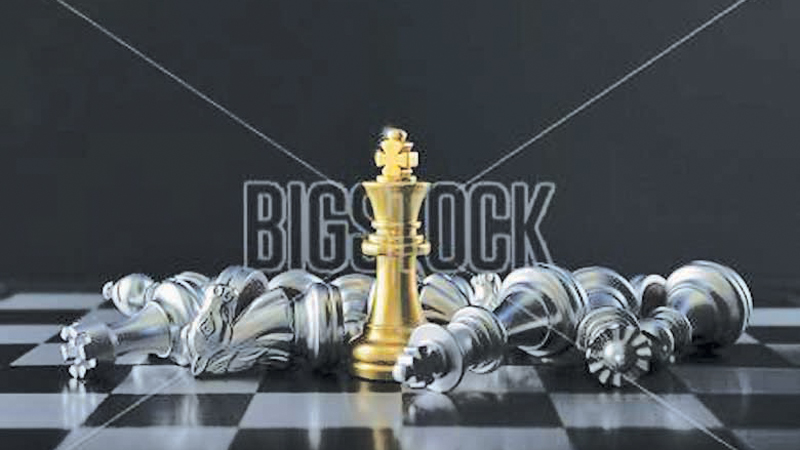“ Victory has a thousand fathers, but defeat is an orphan”. -John F. Kennedy
 In the intricate world of politics, the concepts of victory and defeat are often framed as stark opposites. We glorify winners and pity losers, seeing the triumph of one as a direct outcome of the other’s failure. However, the truth is more nuanced. Victory and defeat are not as clear-cut as they seem. In fact, they can be understood as two sides of the same coin—each possessing elements of the other, and each capable of teaching powerful lessons to both individuals and nations.
In the intricate world of politics, the concepts of victory and defeat are often framed as stark opposites. We glorify winners and pity losers, seeing the triumph of one as a direct outcome of the other’s failure. However, the truth is more nuanced. Victory and defeat are not as clear-cut as they seem. In fact, they can be understood as two sides of the same coin—each possessing elements of the other, and each capable of teaching powerful lessons to both individuals and nations.
At the surface level, victory is synonymous with success, strength, and the realization of goals. It brings with it a sense of accomplishment and a validation of one’s efforts, decisions, and strategies. In the political arena, this often translates into gaining power, the right to govern, and the ability to shape the future. Yet, beneath the celebration and pride that victory brings, there is also a burden—one that is often overlooked.
Victory is not free of cost. With it comes a heavy responsibility to fulfill promises, manage expectations, and steer a nation in the right direction. The challenges of governance and leadership weigh heavily on those who hold power. Decisions must be made in the face of competing interests, the pressure of time, and the constant scrutiny of the public. The winner must confront the harsh reality that victory does not always guarantee smooth sailing.
Victory often carries the seed of future challenges. The arrogance or complacency that sometimes accompanies success can be a leader’s downfall. When victory breeds overconfidence, leaders may become disconnected from the needs and concerns of their constituents. They may lose touch with the reality on the ground, believing that the battle for influence and public support has been won forever. Yet, history teaches us that victory can be fleeting, and those who rest on their laurels may soon find themselves struggling to retain their position.
It is important to understand that the political landscape is dynamic. What seems like a decisive win today may turn into a problem tomorrow if it is not managed with wisdom and care. Victory, though celebrated, requires continuous effort to sustain. Without a firm understanding of the complexities that lie ahead, even the most resounding triumphs can slip away.
On the other hand, defeat is traditionally associated with failure, loss, and humiliation. In politics, losing an election or a key battle can feel like a monumental setback. The public perception of defeat often revolves around disappointment, with leaders being seen as incapable of achieving their objectives or responding to the needs of the people. However, defeat also has a side that is less acknowledged but equally significant—it offers an opportunity for reflection, learning, and growth.
In moments of defeat, leaders and their supporters are forced to reevaluate their strategies, assumptions, and approach. This process of introspection, though painful, can lead to new insights and a stronger foundation for future success. The most resilient political figures are often those who have learned the most from their losses. They understand that defeat, rather than marking the end of a journey, can signal the beginning of a more profound transformation.
Defeat also fosters humility, a trait that is invaluable in politics. It reminds leaders of their limitations and the importance of listening to their constituents. This humility often leads to a more inclusive and empathetic approach to governance, one that is rooted in an understanding of what the public truly desires. It is in defeat that leaders learn the value of resilience, perseverance, and adaptability.
What is essential to recognize is that victory and defeat are not fixed states. In the political arena, they are temporary, fluid, and often interdependent. Today’s victory may lead to tomorrow’s downfall if handled poorly, just as today’s defeat can be the foundation for future success if lessons are learned and applied wisely.
This dynamic interplay between victory and defeat is especially evident in modern political cycles. Public opinion, social issues, and global crises shift rapidly, often requiring political leaders to adapt quickly. A government that fails to respond to these changes may find its position of strength eroded, while those in opposition may seize upon these opportunities to regroup and eventually turn the tables.
In this sense, victory should not be viewed solely as a moment of triumph, nor should defeat be seen as the end of the road. Both are opportunities for growth, evolution, and renewal. A wise leader or political entity understands that victory is not a licence for complacency, just as defeat is not a signal to give up.
In evaluating victory and defeat, perspective is everything. Rather than becoming overly fixated on the results of a single election, policy decision, or campaign, it is crucial to take a long-term view. Political landscapes are constantly shifting, and the forces that shape them are often beyond immediate control. What matters most is not just winning or losing, but how one responds to the outcome. A victory without strategy and foresight can unravel, while a defeat met with perseverance can set the stage for future greatness.
In this regard, both victory and defeat are fleeting. They are moments in time, markers on a longer journey that may span decades or generations. Political entities, leaders, and even nations must recognize that true success lies not in a single victory, but in the ability to navigate the cyclical nature of politics with grace, humility, and resilience.
Victory and defeat are not as separate as they may seem. They are interconnected forces, each carrying within them the possibility of transformation. The political landscape is ever-changing, and those who rise to power must balance the joy of victory with the weight of responsibility. Likewise, those who fall in defeat must recognize the potential for growth and renewal.
Ultimately, the true measure of political success is not found in the celebration of victory or the despair of defeat, but in the wisdom gained from both experiences. A wise leader understands that victory is never final, and defeat is never fatal—it is the courage to continue and adapt that truly defines greatness.







